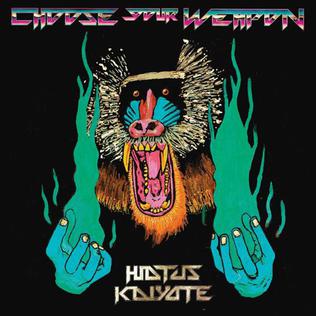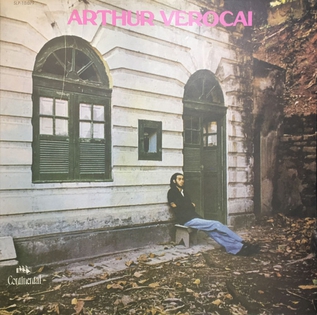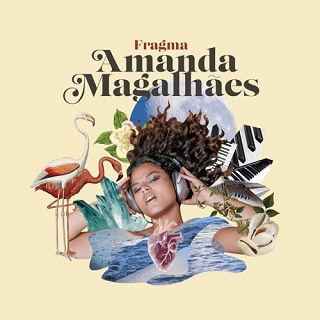
Antônio Maurício Horta de Melo is a Brazilian jazz guitarist and vocalist.

"Sonífera Ilha" is the debut single by Brazilian rock band Titãs, released in 1984. The song, as well as its b-side "Toda Cor", was co-composed by Ciro Pessoa, one of the lead singers and founding members of the group, who would leave the band before the release of their first, self-titled album, in which the single and the b-side were included. "Sonífera Ilha" is among a few of Ciro's contributions to Titãs.

Leny de Andrade Lima, known professionally as Leny Andrade, was a Brazilian singer and musician. Both Andrade's first and last names are sometimes misspelled in English as "Lenn", "Leni", and "Adrade". She had several hits on the Brazilian charts. In 2007 she shared a Latin Grammy Award with Cesar Camargo Mariano for Best MPB Album, Ao Vivo.
Ugo Marotta is a Brazilian musician, conductor, arranger, composer, keyboardist and vibraphonist. He took part at the Brazilian music movements Bossa Nova and Musicanossa.
Kleber Cavalcante Gomes artistically known as Criolo and previously as Criolo Doido is a Brazilian rapper and songwriter, four times nominated to the Latin Grammy Awards. With a career starting in 1989, he was originally known in Brazil as the creator of Rinha dos MC's, but has gained worldwide attention for his solo work and, in particular, the album Nó Na Orelha (2011). In 2019, he was nominated for two Latin Grammy Awards, for "Boca de Lobo" and "Etérea". In 2022, he was nominated again for two Latin Grammy Awards, for "Sobre Viver" and "Me Corte Na Boca Do Céu - A Morte Não Pede Perdão".

Hiatus Kaiyote is an Australian jazz/funk band formed in Melbourne in 2011, made up of singer/guitarist Nai Palm, bassist Paul Bender, keyboardist Simon Mavin, and drummer Perrin Moss.

Choose Your Weapon is the second studio album by Australian neo-soul quartet Hiatus Kaiyote, first released in 1 May 2015 through Flying Buddha and Sony Masterworks. Following the release of the band's debut album Tawk Tomahawk (2012) and their first Grammy nomination, Hiatus Kaiyote went on to tour throughout 2014. Over the span of two years, recording sessions took place in Australia and the United States.

Megatamainho is the second studio album by Brazilian musician, actor and director Gero Camilo, released in 2014. It was produced by Bactéria, former keyboardist and guitarist of Mundo Livre S/A, and it features partnerships with Luiz Caldas, Vanessa da Mata, Otto and Rubi. Camilo describes the album music as something with potency "for dance, for celebration". He also said that he didn't make an effort towards any genre, and that it comes naturally "from my relation with my taste, from receiving things without prejudice".

Anavitória is a Brazilian musical duo consisting of Ana Clara Caetano Costa and Vitória Fernandes Falcão. Formed in 2015, Anavitória debuted with an EP produced by Tiago Iorc after being discovered by Iorc's then manager Felipe Simas. They have released a total of four albums, two of which were nominated for Best Contemporary Pop Album at the Grammys. The duo have worked with multiple artists in the Brazilian music scene including Nando Reis and Rita Lee.

Naomi Saalfield, known professionally as Nai Palm, is an Australian musician, best known as the vocalist, guitarist and occasional pianist for the jazz/funk band Hiatus Kaiyote.

Arthur Verocai is the debut studio album by Brazilian composer Arthur Verocai, released by Continental Records in 1972.

Naiara de Fátima Azevedo is a Brazilian singer-songwriter.

Amanda Magalhães is a Brazilian actress, singer-songwriter, pianist and producer, known for the role of Natália on Netflix series 3%. In 2020, she released her debut album, Fragma.

Fragma is the debut album by Brazilian singer and pianist Amanda Magalhães, released on 16 September 2020. With Fragma, Magalhães says she intended to "unite [...] the tropical swing of Brazilian rhythms and the American black music feel". The album was entirely written and produced by her and she defined it as "an album that talks about affection and brings the stages of my affectionate life, filled with black music, samba and MPB".

Thalía is a compilation album by Mexican singer Thalía, and fourth eponymous album released on 9 December 2013, by Sony Music. The album was released exclusively in Brazil.
Čao Laru is a French-Brazilian band formed in 2015 in Rennes, France. They mix up elements of many musical styles and are considered a "traveling" or "nomad" group, since they are constantly traveling in their Kombi in order to tour.
Célia Regina Cruz, better known as Célia, was a Brazilian singer.

Mood Valiant is the third studio album by Australian neo-soul quartet Hiatus Kaiyote, released in 2021 on Brainfeeder. The album peaked at number 4 on the ARIA charts.

Vera Cruz is the third solo album by Brazilian heavy metal singer Edu Falaschi, the first with all-new material, released initially on May 12, 2021, in Japan via MS Metal Records, digitally to the rest of the world on May 18, 2021. The album was then released physically, first in Brazil on May 31, 2021, and then to the rest of the world on June 15, 2021.

Jheison Failde de Souza, better known by his artistic name Ferrugem, is a Brazilian singer and composer.















